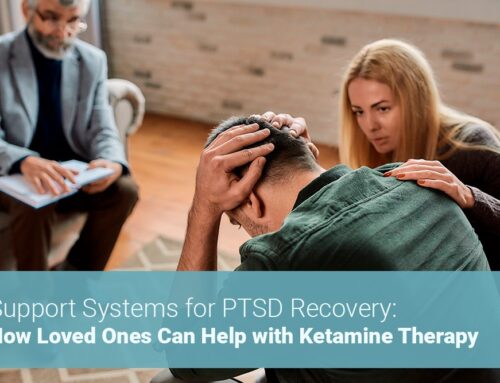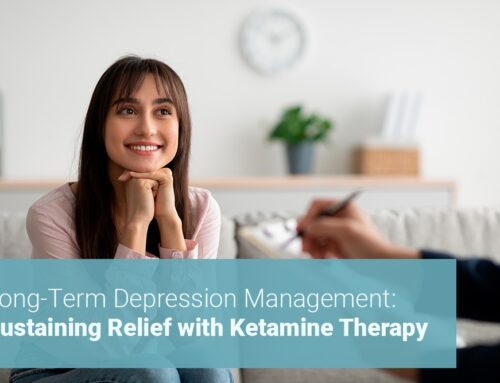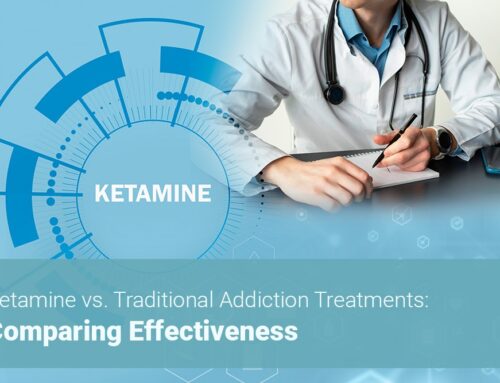Breaking free from substance abuse is a hard-won fight. But the reality is that 40-60% of people will relapse within a year. Shifting the dynamic in your favor requires treatments for addiction that work — therapy that targets dependency in the brain where it begins. If conventional options have failed you, it’s time to consider ketamine treatment for substance abuse from Progressive Medical Solutions.
What Causes Addiction?
Addiction is a vicious cycle. Substance use brings pleasure, which encourages repeated use. With each dose, however, the body becomes more tolerant to drugs or alcohol, needing higher doses to feel satisfied. Efforts to quit cause severe physical symptoms, and using is an easy cure. The respite is brief, however, because with each relapse, addiction worsens, and the cycle continues.
Why Are Relapse Rates So High?
Addiction, researchers know, causes changes in the brain. Substance use creates neural circuits that reinforce intense cravings. These physiological changes persist well beyond efforts to quit, making relapses nearly inevitable. What addicts need are treatments that address biology before behavior — an approach that only ketamine offers.
How Does Ketamine Work?
Ketamine acts primarily as a glutamate receptor antagonist. By blocking these receptors, it reduces the formation of neural pathways associated with substance use and addiction. This, scientists believe, resets the brain’s reward system, making it easier for individuals to abstain from substance use during the early stages of recovery.
Ketamine also:
Stimulates Neuroplasticity
By producing chemicals that promote the growth and maintenance of new nerve cells, ketamine promotes neuroplasticity — the brain’s ability to heal itself. This may help people with substance abuse disorders break the relapse cycle by maintaining healthier brain physiology for as long as it takes to beat cravings.
Targets Pain
Nearly 80% of heroin abusers blame pain medications for their addiction. Ketamine is known to have anti-inflammatory and analgesic properties that tame discomfort. Increasing levels of gamma-aminobutyric acid (GABA) in the brain produces a relaxing effect not unlike prescription opioid pain relievers but with less risk of dependency.
Treats Depression

Depression is often a co-occurring disorder in people struggling with addiction. Ketamine has proven antidepressant effects and may indirectly support recovery by reducing the urge to self-medicate with drugs or alcohol.
Enables Self-Reflection
Ketamine is a dissociative drug that causes a mild, psychedelic-like experience. Some people report that this effect changed their perspective on addiction, empowering them to confront the underlying psychological and emotional issues that contribute to their substance abuse.
What Does the Science Show?
If you’re struggling with addiction, you’ve heard promises about new treatments before. But few, if any, had the depth of scientific evidence supporting using ketamine for substance abuse. Studies have shown remarkable results.
Participants report:
Reduced Cravings
Cravings are the gateway to relapse, so treatments for addiction that work must address this key issue. Ketamine has shown the ability to reduce the desire for cocaine, opioids, and alcohol.
Two studies show a significant reduction in cravings among subjects addicted to cocaine. Compared to conventional addiction treatment with lorazepam, a benzodiazepine, two-thirds of participants given ketamine chose monetary rewards over a hit, demonstrating a reduction in cravings. And use was reduced for weeks after a single infusion, showing lasting benefits.
Similarly, up to half of subjects addicted to heroin remained abstinent for at least a year after ketamine treatment for substance abuse. One-year abstinence rates exceeded 65% for alcoholics.
Improved Motivation to Quit

Not everyone addicted to substances is motivated to quit. Some have been burned by repeated relapses, while others fear withdrawal symptoms. Still, for these people, ketamine shows promise, boosting the motivation to quit even among those not seeking treatment for substance abuse.
In a study of subjects who admittedly did not want treatment for cocaine abuse, ketamine therapy significantly reduced subsequent use.
Fewer Withdrawal Symptoms
Withdrawal symptoms are uncomfortable at best and potentially fatal. Opioid users complain of nausea, vomiting, diarrhea, insomnia, and changes in mood. Alcohol withdrawal, however, can be life-threatening, with symptoms ranging from tremors and confusion to seizures, coma, and death.
Research shows that ketamine may suppress the physiologic responses to opiate withdrawal, lowering blood pressure, heart rate, and levels of stress hormones. The benefits are even more profound for alcoholics.
Among those hospitalized for severe withdrawal symptoms, ketamine universally reduced the need for adjunct benzodiazepine treatment.
A Better Mood
Experts recognize the link between depression and alcohol use. Self-medication is a common but unfortunate phenomenon. Studies demonstrate that using ketamine for substance abuse may have a positive impact on depressive symptoms, improving a patient’s ability to manage relapses.
Is Ketamine Treatment for Substance Abuse Safe?

All medical treatments, including ketamine, have potential risks. However, the consensus among researchers is that it’s generally safe and well-tolerated when administered in medically controlled settings by experienced healthcare professionals. The side effects may include nausea, headache, confusion, and numbness in the extremities. These symptoms are generally short-lived and mild compared to other pharmacological treatments for substance abuse.
While it’s too soon to guarantee the long-term safety of ketamine — studies are ongoing — the uncertainty must be balanced against the risks of continued addiction. Each relapse is a losing battle that makes the war harder to win.
How Many Treatments Will I Need?
Ketamine treatment for substance abuse varies for everyone. Treatment plans are individualized to meet each client’s unique goals. But in one particularly telling study, 50% of participants receiving multiple ketamine treatments were abstinent from alcohol at their 1-year follow-up. Similar findings were noted among heroin users.
However, only 22% receiving a single treatment fared as well, suggesting that maintenance therapy may help prevent relapses. The team at Progressive Medical Solutions may recommend additional infusions if you respond favorably to your first treatment.
Final Thoughts
Ketamine treatment for substance abuse disorders is available at specialty clinics nationwide. If you live in the Las Vegas area, Progressive Medical Solutions is standing by. Making significant changes requires bold action and the support of professionals with your best interests in mind. Winning begins with the decision to try.








